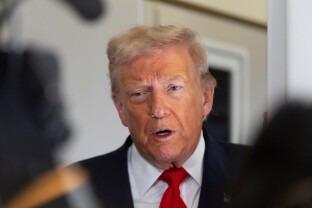Democrat lawmakers said this week that the Trump administration’s threat to cut off aid to Colombia could weaken U.S. intelligence networks and undo decades of security cooperation with one of Washington’s closest allies in the hemisphere.
President Donald Trump has escalated his feud with Colombian President Gustavo Petro in recent weeks. Last week, Trump accused him of allowing cocaine production to soar and announced sanctions on him, while threatening to suspend about $377 million in annual assistance. The administration also announced in September that it decertified Colombia as a partner in the war on drugs for the first time in nearly 30 years.
Sen. Chris Van Hollen of Maryland called the move “incredibly shortsighted,” saying the funding directly supports U.S. drug-interdiction operations.
“The Trump administration is just shooting ourselves in the foot,” he said. “All of this is just vindictive actions by Donald Trump.”
Sign Up for NOTUS’ Free Daily Newsletter
Van Hollen said lawmakers have not been briefed on the policy or the reported U.S. airstrikes against suspected drug vessels in the region. “This is a lawless president,” he said. “Republicans in the House and the Senate are rubber stamps for Donald Trump.”
Tension escalated earlier this month after Petro condemned U.S. strikes on suspected drug boats in the Caribbean that Bogotá says killed Colombian civilians. In response, Washington revoked Petro’s visa and canceled bilateral meetings.
Democrats are concerned the fallout could cripple intelligence sharing that U.S. agencies rely on to track narcotics networks across the Caribbean and Pacific. Colombia remains a primary listening post for U.S. Southern Command, which analysts say receives about 80% of its actionable counter-drug intelligence from Bogotá.
Sen. Jack Reed of Rhode Island, the top Democrat on the Senate Armed Services Committee, said the decision “doesn’t make sense,” describing Colombia as “a valuable partner” that has fought both leftist insurgents and narco-terrorists. “It could cause complete destabilization of the region which would hurt us, not help us,” he said.
Sen. Chris Coons of Delaware called Trump’s threat of cutting aid “a terrible idea,” citing a long history of cooperation that includes a U.S.–Colombia free-trade agreement and joint intelligence operations. “It’s a mistake to threaten them,” he said.
Sen. Chris Murphy of Connecticut warned that the policy is “destroying relationships in the Western Hemisphere for nothing, allowing China to walk right in and gain more influence in our backyard.”
The White House did not respond to a request for comment.
Analysts say the tension between Trump and Petro threatens to erode one of the few steady U.S. alliances in the region. Since the launch of Plan Colombia in 2000, U.S. funding has trained Colombian forces, supplied surveillance equipment and supported eradication programs credited with weakening guerrilla groups and criminal networks.
Petro has downplayed the U.S. aid threat, saying suspension of economic assistance “would mean nothing,” but warned that cutting military cooperation “would affect our capacity.”
Republicans largely defended the administration’s threat or declined to comment.
“I like it,” said Sen. Lindsey Graham of South Carolina, arguing that Colombia’s government “has taken its foot off the gas pedal when it comes to fighting drugs.”
U.N. data shows that Colombia’s potential cocaine output rose by an estimated 53% from 2022 to 2023.
Graham said that “there are elements of Colombia that are very much allies, but there are elements in Colombia that are antagonists toward America,” adding that the country’s policies “need to change.”
Sen. Jim Risch of Idaho, the chair of the Senate Foreign Relations Committee, backed the decision to reassess ties with Bogotá.
“President Petro has actively promoted the violence in Colombia and the narcotics trade that kills innocent Americans and Colombians with his ‘Total Peace’ policies,” he said, citing Petro’s rollback of coca eradication and outreach to armed groups. “It is right for the president to reexamine the U.S.–Colombia relationship.”
Risch said the White House should go further, calling on it to “immediately stop all non-security assistance to Colombia, put strict limits on the type of security missions we support and reconsider international loans to Colombia.”
Sen. Pete Ricketts of Nebraska called the threat typical of Trump’s negotiating strategy. “He always lays out the far ends of the cases when he’s trying to get negotiating leverage,” Ricketts said. But he added that “Colombia is an ally” and that Washington should “continue to work with Colombia, get them on board.”
Sign in
Log into your free account with your email. Don’t have one?
Check your email for a one-time code.
We sent a 4-digit code to . Enter the pin to confirm your account.
New code will be available in 1:00
Let’s try this again.
We encountered an error with the passcode sent to . Please reenter your email.


